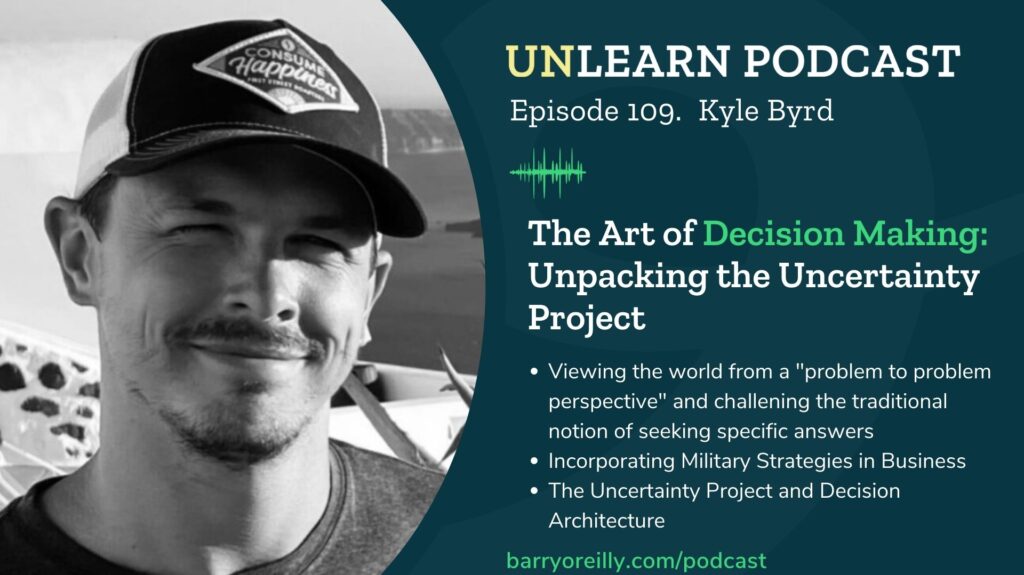Kyle Byrd is a seasoned product strategy and uncertainty leader with a background in industrial design. He was the former Head of Product at Atlassian, where he led the product strategy for Jira Align, a leading enterprise agile planning software. He is also the founder of the Uncertainty Project, a community initiative aimed at exploring decision-making models to manage uncertainty. In this episode of the Unlearn Podcast, Kyle joins Barry O’Reilly to share his unique perspective on embracing uncertainty and problem-solving, drawing from his experiences in transitioning from hardware to software products. He discusses the importance of deep domain expertise and the value of diverse perspectives in decision-making processes.
An Unconventional Foundation
Kyle shares his journey from industrial design to software product management “I’m forever thankful that I got an art degree in college, which was industrial design. It really forces you to unlearn that there is a right answer in a very uncomfortable way,” he says. Kyle’s unique perspective on problem-solving has shaped his career, leading him to view the world from a “problem to problem perspective” rather than an “answer to answer perspective.” This mindset has been instrumental in his work, particularly in his transition from hardware to software, where he found the flexibility to match solutions to problems. His passion for customer engagement and problem-solving was evident during his time at Agile Craft, a startup that was later acquired by Atlassian and transformed into Jira Align, Atlassian’s fastest-selling product. “Product management is one of those worlds where it is all about finding problems, finding fixes, unlocking the next problem,” Barry adds, “and it’s an endless iteration of that.” [Listen from 1:45]

The Art of Business, Choices, and War
Being deeply invested in a problem is crucial to find its solution, Kyle shares. During his transition from a hardware-focused role to a software-focused one, Kyle found himself becoming “hyper obsessed” with understanding why organizations work the way they do. This obsession led him to spend his weekends reading and learning about organizational structures and decision-making processes. Growing up in a military town and being fascinated by the structure of large organizations like the military, he found that many models and techniques used in business have their roots in military strategies. Concepts like wargaming, scenario planning, and Commander’s Intent have found their way into business strategy and decision-making, particularly in large, complex organizations. [Listen from 7:50]
According to Barry, decision-making is a life skill, not just a business or work skill. Everyone needs to make choices and trade-offs and assess whether the decisions they’ve made are moving them in the desired direction. He highlights the importance of clear objectives and autonomy in fostering agile teams, a concept similar to Commander’s Intent, a strategy that focuses on the desired outcome of a mission. “So many of these decision-making approaches come from the military… All of these skills that allowed high maneuverability of small teams to outmaneuver big armies, a lot of them came from these sorts of ideas [and are now being translated] into companies,” he says. [Listen from 12:20]
The Uncertainty Project
Kyle started The Uncertainty Project as an initiative to explore decision-making models in environments of extreme uncertainty. Based on extensive research on the intersection between decision-making science, product management and strategy, the project aims to bridge the gap between academia and practical application, focusing on decentralized decision-making in large organizations. Another goal is to create a community around the topic of managing uncertainty, inviting contributions from professionals across various industries and fostering dialogue and discussion on the subject. Kyle discusses institutional knowledge, which refers to the collective knowledge and experiences of an organization. Preserving this knowledge can provide valuable insights into past decisions and actions, which can then inform future strategies and decisions. [Listen from 18:55]
Institutional knowledge is often lost over time, Barry shares, especially when key individuals leave the organization. He mentions the challenge of tracing back the origins of certain decisions when the people involved have moved on. In Kyle’s ideal future, an organization would be able to trace its current state back to all the decisions that led to it, creating a clear and comprehensive record of its institutional knowledge. Making the decision-making process more explicit and transparent could contribute to building this future. [Listen from 24:05]
Decision Architecture
Kyle discusses the concept of decision architecture as a systematic approach to improving the speed and effectiveness of decision-making within organizations. This doesn’t involve slowing down the process with heavy bureaucracy – it’s about clarifying ownership and accountability. In other words, it underscores the importance of understanding who is responsible for what decisions, and ensuring that those individuals or teams have the authority they need to make those decisions effectively and efficiently. This approach, he suggests, can lead to a net positive gain for organizations, improving not just strategic advantage but also the overall experience of collaboration and communication within the team. [Listen from 27:55]
Looking Ahead
Kyle shares his excitement about the future of The Uncertainty Project, particularly in translating the theoretical aspects of decision-making under uncertainty into practical applications that can impact the way people work and make decisions. He encourages listeners to engage with the content on The Uncertainty Project’s website and to think about how the concepts discussed can be applied within their own organizations. [Listen from 31:50]















